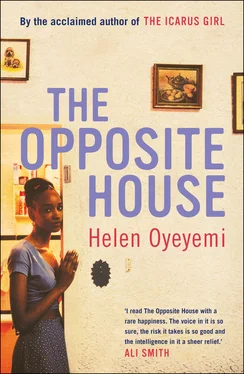Helen Oyeyemi - The Opposite House
Здесь есть возможность читать онлайн «Helen Oyeyemi - The Opposite House» весь текст электронной книги совершенно бесплатно (целиком полную версию без сокращений). В некоторых случаях можно слушать аудио, скачать через торрент в формате fb2 и присутствует краткое содержание. Год выпуска: 2008, Издательство: Bloomsbury UK, Жанр: Современная проза, на английском языке. Описание произведения, (предисловие) а так же отзывы посетителей доступны на портале библиотеки ЛибКат.
- Название:The Opposite House
- Автор:
- Издательство:Bloomsbury UK
- Жанр:
- Год:2008
- ISBN:нет данных
- Рейтинг книги:4 / 5. Голосов: 1
-
Избранное:Добавить в избранное
- Отзывы:
-
Ваша оценка:
- 80
- 1
- 2
- 3
- 4
- 5
The Opposite House: краткое содержание, описание и аннотация
Предлагаем к чтению аннотацию, описание, краткое содержание или предисловие (зависит от того, что написал сам автор книги «The Opposite House»). Если вы не нашли необходимую информацию о книге — напишите в комментариях, мы постараемся отыскать её.
The Opposite House — читать онлайн бесплатно полную книгу (весь текст) целиком
Ниже представлен текст книги, разбитый по страницам. Система сохранения места последней прочитанной страницы, позволяет с удобством читать онлайн бесплатно книгу «The Opposite House», без необходимости каждый раз заново искать на чём Вы остановились. Поставьте закладку, и сможете в любой момент перейти на страницу, на которой закончили чтение.
Интервал:
Закладка:
‘The story goes that the township was established when a company of slaves managed to escape the slave gatherers and fled west of Lagos. They did not know where they were going, but they passed some caves in which a spirit dwelt. They were afraid of the spirit, but less afraid of the spirit than they were of losing themselves. And that spirit repaid their trust, and it took care of them and showed them fertile land where they could live. I ask, I always ask, Where is that spirit? Why did it only go with those slaves who escaped? Anyway, forget about going. You’re not from there any more.’
He talks about the spirit. He talks about the spirit but he doesn’t know. Papi thinks ‘spirit’ and in his mouth the word becomes Geist , a train of reason that chugs on and on and drags us all behind it without our understanding. But I want to make Papi understand about my Cuba memory and St Catherine’s, that strange, safe Old Testament feeling that was there in the night, peace in the centre of a locust swarm. The sting that catches you before you have a name for it.
As if he knows what I want to say, Papi tells me, ‘I did not want to raise. . “spiritual” children. Spirituality doesn’t protest injustice, it just bears it. I don’t want that. I want you to think.’
It must be something in my expression that makes him reach for me now. But I stand up.
To Mami I say, ‘Why don’t you tell him? Why don’t you tell him about all your flowers and your crying?’
Mami covers her mouth with her hand and says nothing. She looks sick.
I sit at Tomás’s dressing table with all his tiny paint tubes in front of me, and my tears have dried on my face. I look at my brother’s reflection in the mirror. His hands are on my shoulders. When he sees what I’m looking at, he self-consciously touches the wound on his lip and hisses, ‘Shut up.’
‘You should leave that school,’ I say. ‘Tell Chabella and she’ll find another school.’
He picks up one of the paint tubes. ‘You want some on?’
It scares me, the thought of him choosing his armour already, the thought that already he is hiding. Tomás balances a tube on his palm, squints at it with one eye closed.
‘I run almost twice as fast with this stuff on, you know. I run like no one knows me, like no one can hold me.’
I turn back to the mirror. Tomás bends over me with a blanched pearl on his fingertip, and he coasts it over my skin, gentle.
I watch my face begin to disappear under his hand.
At first I think that I will not be able to take Mami’s collar. I expect the beads to fight harder to stay with Chabella. Pricked by the sharp reproof of her scent, I reach under the pillow on her side of the bed and open her incense box, and the collar falls out as if it is glad to go with me. No one discovers me, no one says, ‘What are you doing?’ but I jump anyway and my fingers knot into each other as I yank down the fold of my polo neck with one hand and fasten the collar’s clasp around my throat with the other.
She could just have said to Papi, ‘You don’t understand. Just like you don’t understand about my altar, you don’t understand about this.’
But she didn’t say anything, my mother, my son’s mother once removed.
I find Aaron sitting on the doorstep of the house in his big blue windbreaker. He is eating noodles out of a plastic tub, and there is sauce all over his chin. He smiles up at me, notes the face paint with his finger.
‘That was a long Mass,’ he says. ‘Are you cheating on me?’
I tweak his nose. ‘Yes. His name is Father Rodriguez. He gave me a message for you: those who wish to be saved must share all that they have.’
He motions for me to sit down with one hand, jabbing with his chopsticks to make sure that I don’t kick his camera, which is set on the step below him.
‘How was it mentoring the Ewe posse?’ I ask him. He smiles and says, ‘Not one of them has even the makings of a hang king in him.’
He feeds me a long noodle strand, and I cup my hands around his face to make it secret that I’m kissing him.
‘You’re tired,’ he says, eventually, and I say no, but my eyes feel as if they’re receding into my skull and I am already beginning to wonder how I will pick my limbs up in order to take them inside.
Aaron snaps the lid back onto his noodle tub. ‘There was a message on the answer machine when I got back,’ he says. ‘From a Sister Perpetua.’
Sister Perpetua, who is so sure that darkness is part of heaven. St Catherine’s, where darkness comes for me and it is not hell. He looks at me, waits, as if I have to say something to reassure him that I’m staying with him, but I just say, ‘Oh.’
‘She said —’
I force myself to say it softly: ‘I’ll listen to it myself.’
He smiles unhappily; his eyes search me.
Sister Perpetua’s message is simple: she felt moved to speak to me, and she wants me to know that I am always welcome to visit, that I must come if I need space to think.
I don’t want to think. I thought I wouldn’t be one of those pregnant women who touched their stomachs, but I am touching, wondering do I still feel pregnant, trying not to let myself know that I’m wondering.
Aaron stays outside and stays outside and stays outside. It is cold out there and fast becoming night. I want Aaron to come in to me. But I just stand at the window, looking up and out into the street, and all I can see are his legs, dressed in dark jeans, stretched a long way over the grey steps.
On the window, dusk is formed into a mushy hand shape, a single print. I stare at it, then switch on a lamp and lift my hand to the print. I cannot understand why someone has pressed their hand so hard against the window. I cannot understand why there is only one handprint. The interior is solid, like a mist breathed against the glass, and there are no skin patterns, no fingerprint patterns. This print has been left by a cold glove, a morgue glove. I tell myself that it’s not true, it’s not true, it’s not true. I say, ‘Aaron,’ as if he could hear me through the glass, and of course he doesn’t notice that I am calling him, and so to bed.
15 the king who does not speak
No Kayodes in the somewherehouse, and so Aya hears nothing but the cedar beams whispering until Mama Proserpine strides out into the hallway to find her. Because it is a mask day for Aya’s Mama, and because Proserpine is not wearing a mask this mask day, Aya averts her own gaze. Proserpine’s wooden mask is secured atop her head in bows of downy lining; her cloak fastens in tarnished bronze links at her throat. Proserpine multiplies and a carnival of cloaked women bend their fractured gazes on Aya.
But no, it is only the mirrors, mirrors everywhere Aya looks.
‘Proserpine, why did you bring the mirrors down?’
Proserpine’s sigh is refined, tolerant: ‘Proserpine is not my name.’
Aya climbs the stairs to the Kayodes’ rooms. She is slowed by flashing mirror surfaces that stir the air in an ascending chime. The house gives way to a spiky maw that snaps at Aya as she opens doors and doors and doors to take down mirrors. Her own aghast reflection runs at her, looms at her, flies from openings to toss her into foreboding until she cries, ‘Who’s that, who’s there?’
The mirrors are studded with the blunt stems of her watchmaker’s seeds, which have staggered into mahogany life; their petals all point one way. The attic, nude and luxuriating in its new dark, welcomes Aya by spattering her with moths. Aya sits with her back against the door and places her hand over her juddering heart.
But the hard flowers are here too — she didn’t forget the attic when she was planting them. The flowers point: Aya is meant to go still higher.
Читать дальшеИнтервал:
Закладка:
Похожие книги на «The Opposite House»
Представляем Вашему вниманию похожие книги на «The Opposite House» списком для выбора. Мы отобрали схожую по названию и смыслу литературу в надежде предоставить читателям больше вариантов отыскать новые, интересные, ещё непрочитанные произведения.
Обсуждение, отзывы о книге «The Opposite House» и просто собственные мнения читателей. Оставьте ваши комментарии, напишите, что Вы думаете о произведении, его смысле или главных героях. Укажите что конкретно понравилось, а что нет, и почему Вы так считаете.












